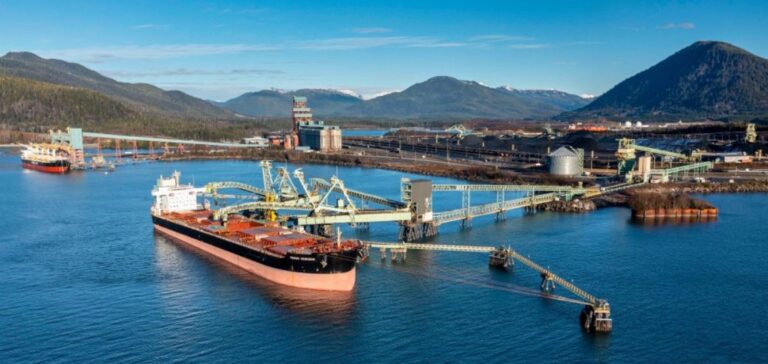Trigon Pacific Terminals Limited (Trigon) recently reached a major milestone in the construction of its Berth Two Beyond Carbon (B2BC) project, located in Prince Rupert, British Columbia. The project, which represents an investment of $173 million, aims to diversify and increase the terminal’s capacity from 18.5 million tonnes to around 33.5 million tonnes annually. Thanks to support from Transport Canada’s National Trade Corridors Fund, Trigon has completed more than 50% of the necessary marine work.
Currently, 75% of the piles, which will form a permanent part of the structure, are already in place. The new marine artificial reef, essential for the marine habitat, has also been installed. The final phase of the project, involving the installation of the upper quay equipment, is scheduled for completion by the end of 2026. According to Trigon CEO Rob Booker, this diversification will enable the company to export hydrogen in the form of ammonia and liquefied petroleum gas (LPG), in particular to Asian markets.
A strategic link for Canadian exports
For decades, Trigon has played a crucial role as a commercial link between Western Canada and the Asia-Pacific region. By 2023, Trigon accounted for almost half of all exports by volume through the Port of Prince Rupert. By diversifying its operations, Trigon is positioning itself to become the key export terminal on the North Coast.
The new quay will be able to accommodate Supramax and Panamax vessels, including very large gas carriers (VLGCs) and ammonia carriers (VLACs), with a draught of 13 meters and an overall length (LOA) of up to 230 meters. Commissioning is scheduled for early 2027. Once operational, this quay will significantly increase Trigon’s capacity to meet the growing demand for energy exports to Asia.
Additional projects and community commitments
In addition to the B2BC project, Trigon is also developing two other key projects. Trigon Pacific’s LPG project involves the conversion of certain storage areas currently used for thermal coal. In addition, Trigon is preparing its industrial land for the future development of bulk liquid storage and handling infrastructures. These initiatives testify to Trigon’s commitment to adapting to market changes and diversifying its activities to remain competitive.
Through strategic investment and expansion, Trigon aims to meet the market’s growing need for alternative energies. In addition to strengthening its export capabilities, these projects should also bring significant economic benefits to the Prince Rupert region, including jobs and business opportunities.
Hydrogen market context and opportunities
The global hydrogen market, valued at around $11.7 trillion by 2050, offers considerable opportunities for Canadian producers. Hydrogen and ammonia are seen as promising alternatives to traditional fossil fuels. Canada and British Columbia, among other provinces, have already put in place strategies for the production and use of hydrogen, aiming to capture a significant share of this growing market.
Japan, for example, has launched an international procurement process to buy 500,000 tonnes of ammonia a year from 2027. Trigon, by being at the forefront of these developments, is well placed to meet this growing demand. The B2BC project represents a major step forward for Trigon, enabling it to capture significant market share and strengthen its position on the international market.
Trigon’s ability to adapt quickly and respond to changing market needs demonstrates its resilience and strategic vision. These expansion and diversification projects are not only responses to current trends, but also preparations for future challenges in the global energy sector.
Trigon’s Prince Rupert terminal, with its modernized infrastructure and new export capabilities, is well positioned to become a central hub for Canadian energy exports. With a skilled workforce and proven operational expertise, Trigon is poised to play a key role in the energy future of Canada and its Asian trading partners.






















